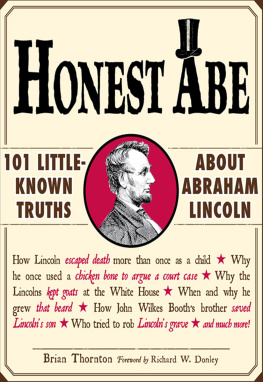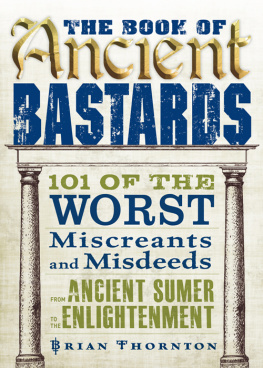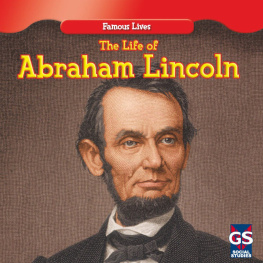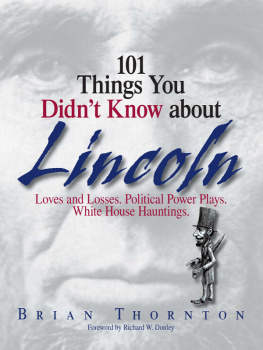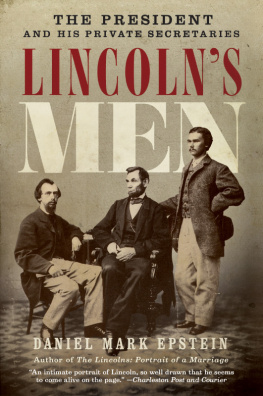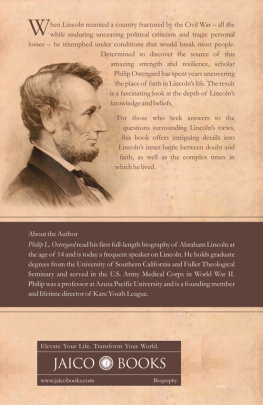Acknowledgments
Someone who knew the young Abraham Lincoln well once said of Abe that he was so poor that he had nothing but friends. Someone else, whose name I don't recall, once said that a man with friends is rich beyond imagining. I agree with that, and this being my first book, I'm beholden to an awful lot of people. I'd like to take a moment to thank them.
First, I'd like to thank Richard W. Donley for being a first-rate graduate school mentor and friend, to say nothing of writing the foreword for this book. Then there are other scholars who helped along the way, like Martin Seedorf from Eastern Washington University, and Robert Carricker, Stephen Balzarini, and the late Tim Sarbaugh at Gonzaga. Thanks to all of you for contributing to a first-rate education.
Also, thanks to my family and friends: my parents, Hal and Berniece, and my brother Paul, for believing in the writer as well as in the project. Seattle-area writer and friend David Morel gave wonderful feedback and generously looked over my work, helping with the seemingly endless polishing process. My attorney friend Cynthia Patterson contributed mightily to the research I did on Lincoln's approach to the law, and is solely responsible for putting me on the trail of Lincoln's chicken bone case.
Then of course, there's the team at Adams Media. Director of Product Development Paula Munier believed that I had a book on Lincoln in me, and offered me the opportunity to get that book out of my system and onto the book racks. My project editor and designated task-mistress, Andrea Mattei, worked tirelessly on shaping my output into something coherent and readable. If you liked the pace, enjoyed the narrative flow, and found elements of this book interesting, thank her. Goodness knows that I can't thank her enough for all of her hard work. You're a workhorse, Andrea, and I'm grateful for the opportunity to pull in the traces with such a consummate professional.
January 7, 2011
Seattle, WA
Foreword
Senator Everett Dirksen of Illinois once noted that politicians of all persuasions had to get right with Lincoln. While this statement no doubt was, in part, made in jest, it does in a small way indicate the pervasiveness of Lincoln's influence on American history since his death in 1865. It's safe to say that more has been written about Abraham Lincoln than any other American.
Every aspect of Lincoln's life has been explored and analyzed by dozens upon dozens of noted historians over the past century, as well as a legion of writers of questionable skill and purpose. Lincoln's speeches and writings have been a source of inspiration for many over the past century and a half. Sometimes, by either distortion or misquoting, he has even been enlisted in causes he would have shunned had he a choice.
Possibly the most disturbing aspect of the Lincoln story is the shroud of myth that has enveloped him over the decades, and has, in a sense, hidden this extraordinary leader and politician from the general population. Almost all of us were brought up on stories of Lincoln the humble lad reading by firelight, his legendary honesty, his feats as a rail-splitter, and hundreds of other tales about his life, be they true or not. Every nation needs its mythic heroes, but in the case of Lincoln, the facts alone make a fascinating story.
As Brian Thornton notes in his introduction, it is his purpose to go behind the iconic figure that Lincoln has become for many, and present to the general reader of history a more human Lincoln to whom we can all relate. Mr. Thornton has not taken the standard biographical approach to Lincoln. Instead, he has looked at various parts of the Lincoln story, some oft-told and some not so well known, to bring us a Lincoln who is a man of incredible accomplishments and a man who is at the same time quite flawed. In other words, he presents the reader with an Abraham Lincoln who is very much like all of us, and at the same time unlike any other American before or since.
Richard W. Donley, professor emeritus of nineteenth-century
American history at Eastern Washington University
Cheney, WA
January 2011
Introduction
There are few historical figures as beloved as Abraham Lincoln. The national monument erected in his honor dominates an entire end of the Mall in our nation's capital. He is one of the most recognizable icons our society has ever produced.
Unfortunately, an icon in the truest sense of the word is a religious image, either a painting or a statue. Americans tend to revere the icon that history has made of Abraham Lincoln without really understanding the flesh-and-blood man behind it.
This is a shame, because the man himself is fascinating enough without all of the trappings of myth that have sprung up in the 140 years since his death. Abraham Lincoln was a man. He was good and he was bad, and like many good American heroes, he was keenly aware of his faults. The resulting humility that others found so endearing both during his lifetime and in the years since his untimely death is a distinctly American character trait. We love for our heroes to be modest.
And yet Abraham Lincoln was so much more than that grave-faced image sitting on the throne in Washington, D.C. A skilled, charming politician, a genius at reading people, a devoted family man, Lincoln was literally the right man at the right time to step forward in his country's darkest hour and be that rarest of men: a leader. He was also a religious skeptic, a frequently inattentive husband, terribly shy around single women, given to bouts of deep depression, and possessed of a short memory when it came to personal friendships. These perceived shortcomings should not be swept into the dustbin of history. Rather, they lend color, perspective, and shading to the polished white marble of one of our favorite statues, showing a man all the more remarkable for possessing these faults.
If you're going to understand this extraordinary man, it is important to humanize the legend, to show him and his extraordinary accomplishments in context. Abraham Lincoln was a remarkable human being who transcended his humble origins, overcame early tragedy, and ascended to the highest office in the land. But that is only half of the story. The intent of this book is to educate as well as entertain, to give Lincoln the man back to the people who so love him. After all, they have more reason to do so than they know.

